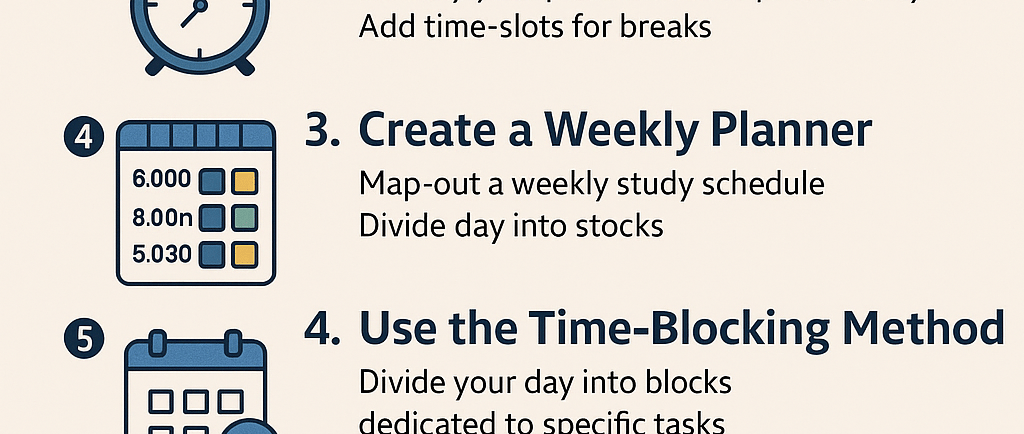How to Develop an Effective Study Schedule


In today’s fast-paced academic environment, having a well-planned study schedule is essential for success. Whether you are a school student, a college-goer, or preparing for competitive exams like NEET, JEE, or UPSC, managing your time effectively can make a significant difference in your performance. A good study schedule helps reduce stress, improves focus, and boosts productivity. Here’s how you can develop an effective study schedule that works for you.
1.Set Clear Goals
Start by identifying your academic goals. Are you preparing for an upcoming exam? Do you need to complete a project or improve in a weak subject? Clear goals help you prioritize your study topics. Break down your goals into smaller, achievable tasks. For example, instead of saying “study biology,” write “complete chapter 3 – Human Physiology.
2.Understand Your Daily Routine
Track your current daily activities for a couple of days. Understand when you are most alert and productive. Some students focus better in the morning, while others are night owls. Identify your peak hours and allocate them for studying difficult subjects or topics that need more concentration.
3.Create a Weekly Planner
Use a digital tool or a physical planner to map out your weekly study schedule. Allocate time for each subject depending on its difficulty and your familiarity with it. Use color codes for different subjects to make it visually appealing. Don’t forget to add time slots for breaks, revision, and relaxation.
4.Use the Time-Blocking Method
Time blocking is a simple yet powerful technique where you divide your day into blocks of time, each dedicated to a specific task. For example, 6:00 AM–7:30 AM: Physics; 8:00 AM–9:00 AM: Breakfast and break; 9:00 AM–10:30 AM: Chemistry. This method helps eliminate distractions and improves focus.
5.Stay Consistent but Flexible
While consistency is key, be realistic and flexible. Unexpected events can disrupt even the best plans. Instead of stressing, adjust your schedule and get back on track. Avoid overloading yourself with long hours of study. Quality matters more than quantity.
6.Include Breaks and Rewards
The human brain needs rest to function at its best. Follow the Pomodoro technique: 25 minutes of study followed by a 5-minute break. After four such sessions, take a longer break. Also, reward yourself for meeting your daily or weekly targets. A small treat or 30 minutes of your favorite show can keep you motivated.
7.Review and Adjust Weekly
At the end of each week, review your progress. Which subjects took more time? Where did you lose focus? Use this feedback to refine your schedule. Make your study plan dynamic and evolving.
Conclusion
An effective study schedule is more than just a timetable—it’s a commitment to your goals. It brings structure, improves discipline, and enhances learning outcomes. By setting realistic goals, understanding your productivity patterns, and staying consistent with breaks and reviews, you can create a schedule that not only works but also empowers you. Remember, smart work always beats hard work when it’s done with planning and purpose.
